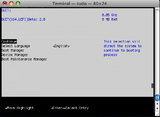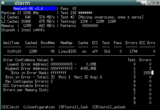Payloads: Difference between revisions
m (→FreeBSD) |
m (→Bootloaders) |
||
| Line 13: | Line 13: | ||
==== GRUB 2 ==== | ==== GRUB 2 ==== | ||
You can use [[GRUB2]] as a coreboot payload, in order to boot | You can use [[GRUB2]] as a coreboot payload, in order to boot an operating system from a hard drive, for instance. You can also boot via an existing GRUB2 on your hard drive by using [[SeaBIOS]] as your coreboot payload. | ||
GRUB legacy is not suitable as coreboot payload, though. | [[Payloads#GRUB_legacy|GRUB legacy]] is not suitable as coreboot payload, though. | ||
==== GRUB legacy ==== | |||
The old GRUB 1 (a.k.a. "GRUB legacy") cannot be directly used as a coreboot payload. | |||
However, you can use [[SeaBIOS]] as payload which allows you to boot any OS via a GRUB legacy you might still have installed on your harddrive. | |||
==== FILO ==== | ==== FILO ==== | ||
[[FILO]] is a simple bootloader with filesystem support. | [[FILO]] is a simple bootloader with filesystem support. It can boot from hard drives (among others), and does not require any legacy BIOS callbacks (unlike [[Payloads#GRUB_legacy|GRUB legacy]], for example). | ||
==== Etherboot / GPXE ==== | ==== Etherboot / GPXE ==== | ||
| Line 35: | Line 41: | ||
==== OpenBIOS ==== | ==== OpenBIOS ==== | ||
[[OpenBIOS]] | [[OpenBIOS]], an open-source IEEE1275-1994 Open Firmware implementation, is also usable as a coreboot payload. | ||
==== Tiano Core ==== | ==== Tiano Core ==== | ||
Revision as of 17:21, 26 September 2010
coreboot in itself is "only" minimal code for initializing a mainboard with peripherals. After the initialization, it jumps to a payload.
Payloads
Bootloaders
SeaBIOS
SeaBIOS is an open-source implementation of the standard bootstrap callback layer implemented by an x86 BIOS. It enables booting from unmodified CDROMs and hard drives.
SeaBIOS has been tested with Linux, NetBSD, OpenBSD, FreeDOS, and Windows XP/Vista/7. Classic GRUB, lilo, and isolinux work well with SeaBIOS. Other x86 bootloaders and operating systems will likely also work.
GRUB 2
You can use GRUB2 as a coreboot payload, in order to boot an operating system from a hard drive, for instance. You can also boot via an existing GRUB2 on your hard drive by using SeaBIOS as your coreboot payload.
GRUB legacy is not suitable as coreboot payload, though.
GRUB legacy
The old GRUB 1 (a.k.a. "GRUB legacy") cannot be directly used as a coreboot payload.
However, you can use SeaBIOS as payload which allows you to boot any OS via a GRUB legacy you might still have installed on your harddrive.
FILO
FILO is a simple bootloader with filesystem support. It can boot from hard drives (among others), and does not require any legacy BIOS callbacks (unlike GRUB legacy, for example).
Etherboot / GPXE
Etherboot is a network bootloader. It provides a direct replacement for proprietary PXE ROMs, with many extra features such as DNS, HTTP, iSCSI, etc.
Older versions of Etherboot included parts of FILO, and thus supported SATA and USB booting.
The new GPXE is not yet supported directly, various code changes are required before it can work as a coreboot payload. However, GPXE works well when run with SeaBIOS.
Open Firmware
Mitch Bradley's Open Firmware, an IEEE1275-1994 Open Firmware implementation, can also be used as coreboot payload.
OpenBIOS
OpenBIOS, an open-source IEEE1275-1994 Open Firmware implementation, is also usable as a coreboot payload.
Tiano Core

TianoCore is a bootloader providing the UEFI interface.
Operating systems
Linux
coreboot can use a Linux kernel as payload directly. That is, the kernel is included in the ROM chip where coreboot resides.
Alternatively, you can also boot a Linux kernel from your hard drive using either the FILO, GRUB2, or SeaBIOS payloads.
FreeBSD
FreeBSD can be booted via coreboot using SeaBIOS.
OpenBSD
OpenBSD can also be booted via coreboot using SeaBIOS.
This use-case is not well-tested yet, though.
NetBSD
NetBSD/x86 boot code is known to work with SeaBIOS.
jakllsch has worked on a partially-complete port of the x86 boot code to the role of native payload. However, with the advent of SeaBIOS, this is likely to become less of a priority. Consult the NetBSD wiki page for further information.
FreeDOS
FreeDOS can be booted via coreboot using SeaBIOS.
Windows
Windows can be booted with the help of SeaBIOS.
We have successfully booted Windows XP, Windows Vista and Windows 7 (Beta).
OpenSolaris
OpenSolaris has multiboot compliant kernels, and so it is possible to boot it with GRUB2 (pending some bug fixes). Some Sun engineers even worked on it, see this article for more information.
Currently, GRUB2 refuses to load the kernel due to a small bug in the multiboot header of the kernel, but the kernel still refuses to work if that is worked around. Maybe they reintroduced some BIOS calls again?
See also this blog entry.
Other
Memtest86 / Memtest86+

Memtest86 is a program which checks your RAM modules.
It can be run from within GRUB, but also as a coreboot payload (i.e. included in your ROM chip).
Note: Current versions of memtest86 may not work anymore due to changes in coreboot. A patch is being worked on.
ADLO
ADLO — Glue layer to 16-bit Bochs BIOS. Allows booting Windows and OpenBSD.
Note: ADLO has been superseded by SeaBIOS. Do not use it anymore.
Libpayload
Libpayload is a helper-library for payload-writers.
Coreinfo

coreinfo is a coreboot payload which can display various system information.
Bayou

Bayou is the working name for a coreboot payload that can choose, load and run other payloads from a LAR archive on the ROM.
Note: Bayou may no longer be in a working state right now, it may or may not be fixed and worked on again. In the meantime, SeaBIOS also provides a mechanism to include multiple payloads in a ROM image and select either of them at boot-time.
Games
GRUB invaders

GRUB invaders is a multi-boot compliant space invaders game.
It can either be started from within GRUB (as a "kernel"), or it can be used as a coreboot payload.
TINT

tint is a falling blocks game.
Possible future payloads
The following payloads might or might not work (with more or less changes required) with coreboot — their usage hasn't been tested or documented so far.
- CodeGen's SmartFirmware — IEEE1275-1994 Open Firmware
- Plan 9 — A distributed operating system.
- RedBoot / eCos — Real-time OS for embedded systems; initial port to ELF completed but no longer available.
- HelenOS
- ReactOS
- DragonflyBSD
- MirBSD
- MidnightBSD
- FreeRTOS
- QNX
- Windows CE
- Haiku
- NanoVM (small JVM)
- uip / lwip (small TCP/IP stacks)
- MenuetOS
- KolibriOS
- Minix
History
The payload was originally intended to be a Linux kernel stored in flash. Flash ROM growth rate was anticipated optimistically however, and today there are not many mainboards that actually have enough flash ROM room for a kernel. 512KB can be seen here-and-there and a few boards come with 1MB or 2MB. Recent kernels really want at least 1MB, and then you'll only have room for 300-400 KB of initial ramdisk, which could be too small too, depending on the application.
So, other payloads are used; the two major ones are FILO and SeaBIOS. Also have a look at GRUB2 and Etherboot (soon to be deprecated in favor of GPXE).